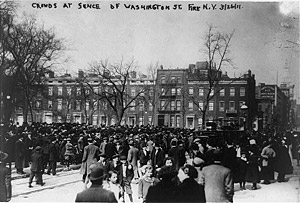
A catastrophic fire swept through the Triangle Shirtwaist Factory 100 years ago today. By the time it was over, 146 people had died. Many lay dead on the sidewalks off Washington Square in the middle of New York’s Greenwich Village, having thrown themselves out windows to escape the flames. Many of the terrified victims — mostly young garment workers, as young as 14, and nearly all Italian or Jewish immigrant women — were engulfed by the devastating flames, unable to escape through the stairways that had been padlocked by the factory owners, and trapped beyond the reach of the firefighters’ ladders.

A crowd gathered in Washington Square Park.
The horrendous event was witnessed by thousands of bystanders, and it is nearly impossible to overstate the fire’s profound impact in igniting multiple movements for reform — from the labor movement to the New Deal — fueling efforts to advance women’s rights and to enact regulations requiring safe working conditions and the right to collective bargaining. It was a rallying cry that helped lead to universal suffrage and the ongoing fight for dignity for immigrant workers.
Many of those who witnessed this tragic event a century ago never forgot — not only the sound of the screams or the smell of the smoke — but the fact that the owners of the business had violently fought the garment workers’ efforts to organize. Just two years earlier, the owners hired thugs to beat up the young women when they demonstrated in support of such modest improvements as sprinklers and unlocked stairwells. Following the tragic fire, efforts to seek justice from the courts were also stymied when the factory owners were acquitted of manslaughter: They had broken no laws because none existed to protect workplace safety in 1911.
The ACLU’s early history was bound up with the labor movement of the 1920s when the impact of the Triangle Shirtwaist fire was still a galvanizing force for reform. Enormous strides have been made in the past 100 years to guarantee the rights of women and the right for workers to organize and to ensure safe working conditions. Still, news of shocking working conditions persist today, from dangerous mines in West Virginia to the discovery of Asian and Latina immigrant garment workers padlocked in sweat shops in downtown Los Angeles. In fact, the ACLU and cocounsel have recently brought what could be the largest human trafficking case in U.S. history, representing a group of more than 500 Indian men lured to work in the U.S. as guestworkers after Hurricane Katrina and forced into involuntary servitude in overcrowded labor camps. These are all stark reminders that such haunting images are not just a distant memory.
The current surge of anti-labor activities, especially the efforts to strip workers of their right to collective bargaining, may portend yet another turning point in American labor history. Prominent labor historians have likened the current goals and animosity of the anti-union forces in places like Wisconsin to the anti-labor sentiments our country witnessed 100 years ago. And there are other disturbing echoes; just as the victims of the Triangle Shirtwaist fire were primarily women, so were the losers in the recent Wisconsin labor dispute as male dominated unions (State Troopers, Firefighters and Police) were largely protected from the cutbacks.
Fortunately, the tragedy of the Triangle Shirtwaist fire has not been forgotten. It still moves us today. This centennial anniversary is an occasion to remember and grieve, but also to reaffirm the important voice that organized labor gives to support the right to collectively bargain, not only on issues related to wages and hours, but also to workplace safety and working conditions. Our voices and our constant vigilance are necessary to ensure that the ladders of the 21st Century will reach those whose lives depend upon them.
We’re holding a month-long blog symposium on women’s rights for Women’s History Month. See all the blog posts here, and learn more about women’s rights: Subscribe to our newsletter, follow us on Twitter, and like us on Facebook.


